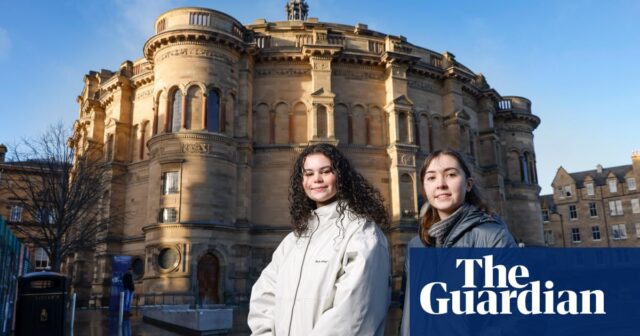From the first day Shanley Breese started her law degree at the University of Edinburgh, she encountered demeaning comments about her accent. She was told she was hard to understand and was asked to repeat herself in tutorials when she used words from the Scots language.
“It was just a little thing to differentiate us and point it out … It meant that I didn’t participate in my tutorials,” she says.
Breese was also shocked to walk around campus and hear students “slagging off” clothes from high street brands such as Primark and TK Maxx, as well as conversations in lecture halls about inheritance tax that concluded with statements such as “rich people just work harder than poor people”.
With only about a quarter of the university’s students coming from Scotland, and the rest being from elsewhere in the UK or overseas, Breese felt in a minority.
In October, the student news publication The Tab Edinburgh received a backlash for commenting that the lack of Scottish students in one of its TikTok videos was “as God intended”. This comment was the final straw. Breese was so disturbed by the discrimination around her she decided to set up a support group for students like herself.
The Scottish Social Mobility Society was founded in Edinburgh with the aim “to provide a community for Scottish students, who are often from working-class backgrounds and frequently experience feelings of alienation, micro-aggressions and subtle acts of exclusion at the university”.
The University of Edinburgh is now offering guidance on how students should treat one another. “Don’t be a snob!” reads the advice to counteract the rising claims of classism and discrimination on campus.
Further advice includes reminding students “when you meet new people be curious about their interests and aspirations rather than their background”, and to “try to undo some of the unhelpful mythology about the relationship of wealth to intelligence or hard work”.
However, the society does not think the university’s guidance is serious enough to help them feel included.
Breese says: “It’s making it like a personality quirk of the students at Edinburgh, rather than a structural, kind of systemic issue … it kind of feels patronising. It really was tone deaf.”
Scottish universities cap the number of Scottish students in their yearly intake as tuition fees are covered by the Scottish government. The institutions then fill the gap with students who can afford the fees from elsewhere in the UK or overseas.
Freya Stewart, a social anthropology student and report officer for the society, says Edinburgh University has also created an environment where staff are unused to advising Scottish students. They often refer to the English qualification model of A-levels instead of Scottish Highers, despite the university’s location, she says.
Stewart says: “My student adviser didn’t know what highers were, or how the SQA [Scottish Qualification Authority] works. A-levels are the standardised system and I would say they don’t really understand what Advanced Highers are. It’s very rare for a student adviser to understand that.”
after newsletter promotion
The socioeconomic gap has been made even greater for Scottish students at the university as Edinburgh follows a “flag” system to prioritise students as part of its Widening Access programme.
To be marked as a “flag” candidate, applicants must live in an area within the 40% of the most-deprived parts of Scotland or come from a low-attainment state school. There are also “plus flag” applicants, which include refugees, care-experienced applicants, or those from the 20% most-deprived parts of Scotland.
While increasing diversity and inclusion, this has created a large gap between the Scottish students, who primarily come from lower socioeconomic backgrounds, and the students from England or other countries.
Before arriving at Edinburgh, Breese didn’t even know private schools existed, and she is the first of her friends and family to go to university. While she is grateful to have been allocated a place at the prestigious university, she is asking for better support.
“They helped me get here but once I was here I was kind of left, that’s how it felt, and that is what affects the feelings of alienation,” Breese says.
A University of Edinburgh spokesperson said: “Our dignity and respect policy sets out clear expectations of behaviour, including recognising when comments or behaviour may be harmful or upsetting to others and acting accordingly. After listening to students, we have also introduced and continue to evolve a new support model that provides more dedicated pastoral and academic guidance throughout their studies.”






